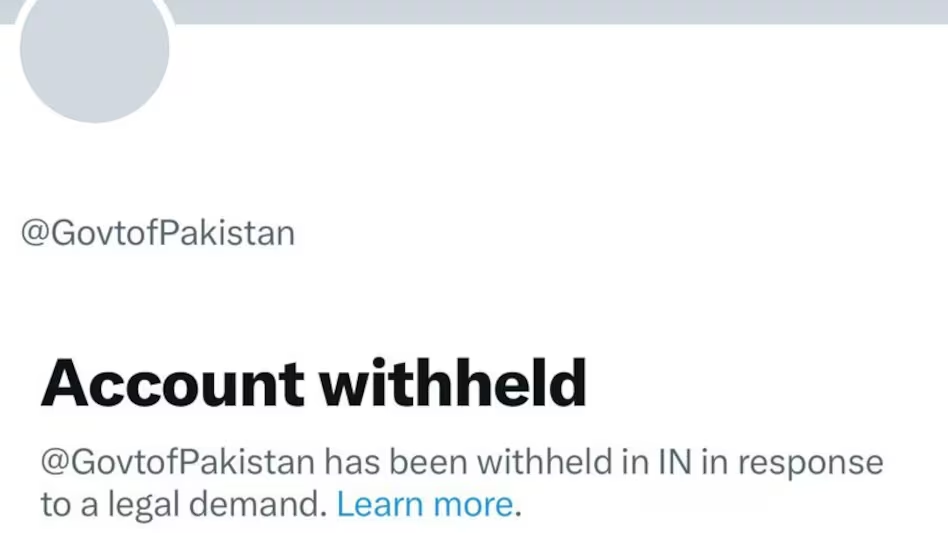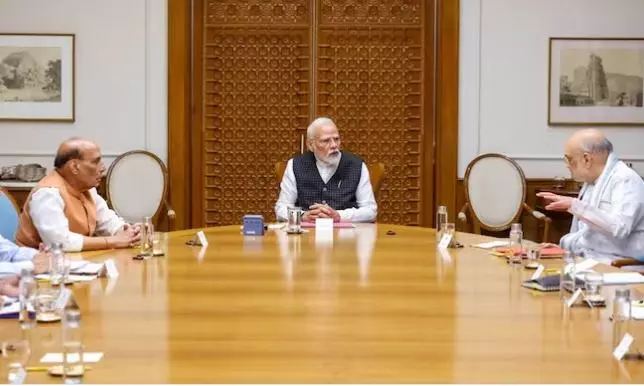
India withholds Pakistan’s official X account after Pahalgam attack
text_fieldsNew Delhi: In a bold and unprecedented response to the recent terror attack in Jammu and Kashmir’s Pahalgam, the Indian government has withheld the official X account of the Government of Pakistan. The move comes in the wake of a brutal assault that left 26 civilians dead and several others injured, prompting a wave of diplomatic, military, and strategic countermeasures from New Delhi.
The terror attack, which Prime Minister Narendra Modi described as a “cowardly attack on innocent civilians,” is believed to have been carried out by The Resistance Front, a terror outfit operating from Pakistan. In response, India has launched a sweeping diplomatic offensive aimed at isolating Pakistan and cutting off various lines of engagement.
Pakistan’s top diplomat in New Delhi, Saad Ahmad Warraich, was summoned to the Ministry of External Affairs, where he was handed a formal Persona Non Grata note for all Pakistani military attaches posted in India. These include Pakistan’s Defence, Military, Naval, and Air Advisors at its High Commission in New Delhi, who have now been ordered to leave the country within a week. In a reciprocal move, India is withdrawing its Defence, Navy, and Air Advisors from the High Commission in Islamabad. Five supporting staff associated with these positions will also be recalled from both sides.
Taking its strongest stand, India has suspended the Indus Waters Treaty of 1960—a landmark bilateral agreement that has survived even the worst phases of Indo-Pak relations. The Ministry of External Affairs confirmed that the suspension will remain in place until Pakistan takes concrete and verifiable action to dismantle the infrastructure supporting cross-border terrorism.
India has also taken the extraordinary step of closing the Integrated Check Post (ICP) at Attari, one of the main land routes between the two countries. Pakistani nationals currently in India, even those holding valid travel documents, have been asked to return home by May 1, 2025. After that date, all overland travel between India and Pakistan will be suspended indefinitely.
Further tightening its visa regime, India has barred Pakistani citizens from entry under the SAARC Visa Exemption Scheme (SVES). All SVES visas issued to Pakistani nationals have been revoked, and individuals currently in India under the scheme have been given 48 hours to exit the country.
In line with its broader diplomatic recalibration, India and Pakistan have agreed to reduce the staff strength at their respective High Commissions. Each mission will now operate with only 30 personnel, down from the current 55, effective May 1. This measure aims to significantly scale down diplomatic interaction between the two nations.
These decisions were taken at a high-level meeting of the Cabinet Committee on Security (CCS), chaired by Prime Minister Narendra Modi and attended by Union Home Minister Amit Shah, Defence Minister Rajnath Singh, External Affairs Minister S. Jaishankar, and other top officials. The meeting, which lasted over two hours, concluded with a directive to Indian armed forces and security agencies to maintain the highest level of alert in anticipation of any further threats.
Meanwhile, the National Investigation Agency (NIA) has deployed a fresh team to Pahalgam as efforts to track down the perpetrators of the attack intensify. Indian authorities are not only pursuing those directly involved in the violence but also seeking to hold accountable the broader network of sponsors and facilitators operating from across the border.
Reiterating its zero-tolerance policy on terrorism, India underscored its determination to ensure that justice is served. Officials cited successful extraditions, such as that of Tahawwur Rana, as examples of India's commitment to using all diplomatic and legal tools at its disposal to bring terrorists and their sponsors to justice on the global stage.
With IANS Inputs














